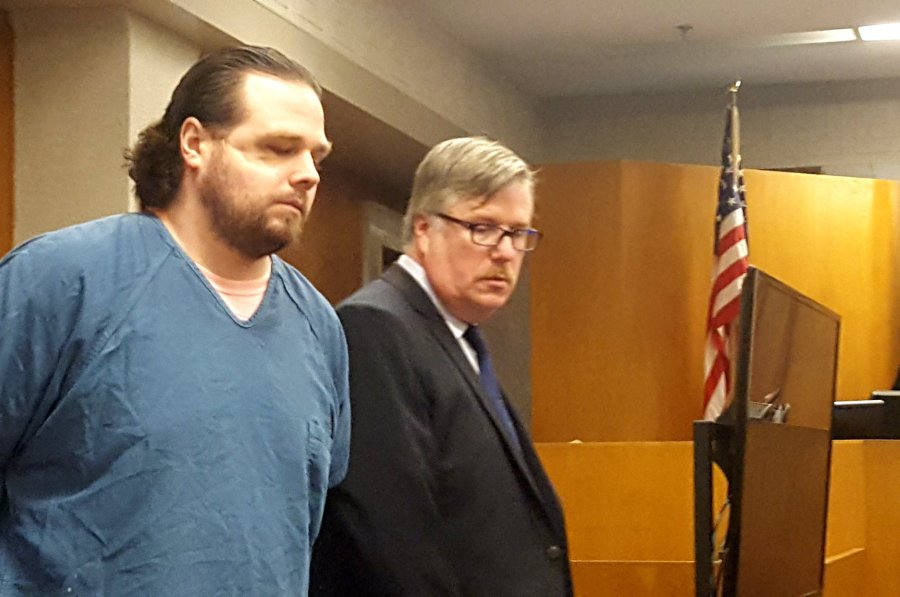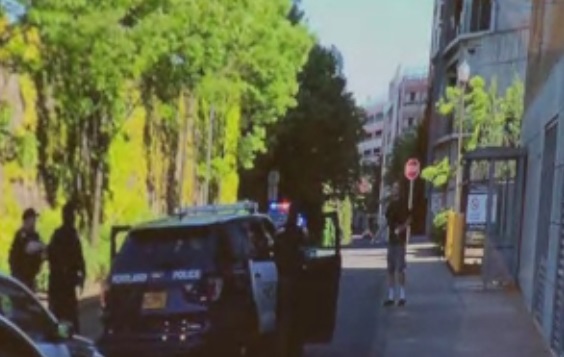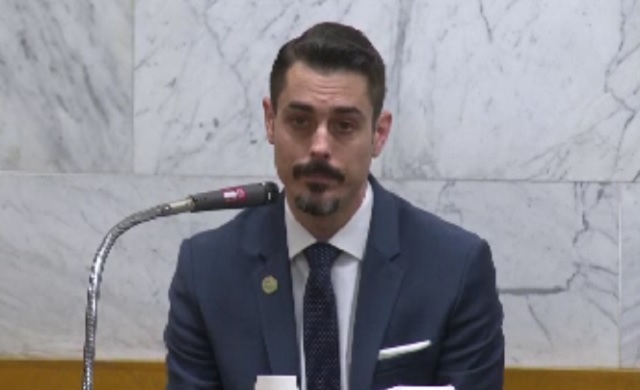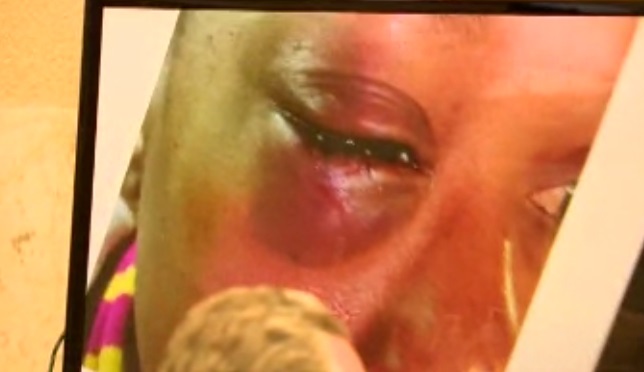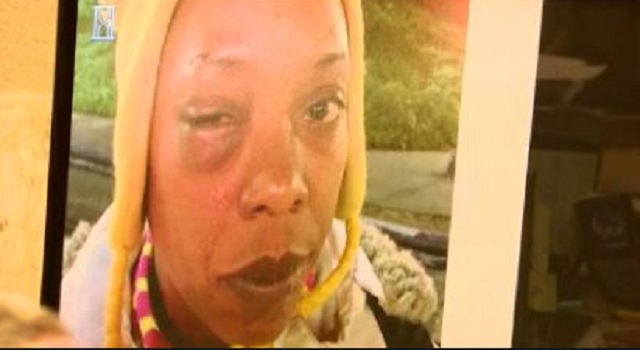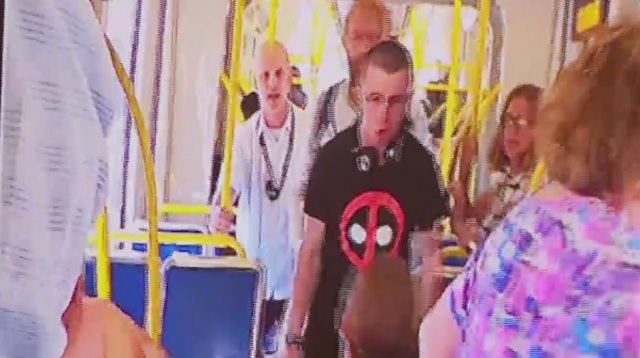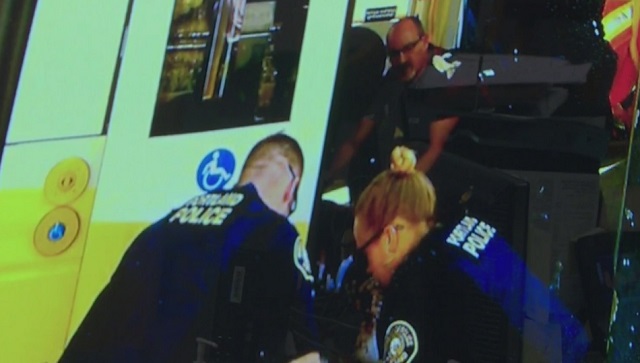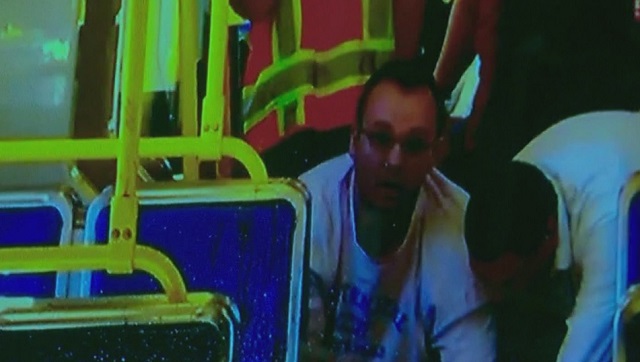PORTLAND, Ore. (KOIN) — As the MAX attack murder trial of Jeremy Christian entered its second week, the benches reserved for victims and their family members were uncharacteristically empty on the fifth day of witness testimony. Only three women sat in the back, including Taliesin Namkai-Meche’s mother.
Testimony in the morning came from a witness who followed Jeremy Christian off the train, a police officer who came upon Jeremy Christian walking on the street after the attack, and an eye doctor who shared information about the injury to Demetria Hester the night before the attack.
In the afternoon, the testimony was dominated by Portland police officers and detectives who responded to the scene and arrested Jeremy Christian, plus a 30-minute video of his arrest and delivery to the police station.
‘I stabbed them in the neck. I hope they die’
Three Portland police officers testified in succession: Andrew Jenson, Brad Nutting, Brad Kula.
Jenson was on an unrelated call the afternoon of May 26, 2017 when the first report he got was of a disturbance on a train, then an update to possibly a stabbing on a train.
Officers who were at the MAX platform communicated they were doing chest compressions on victims, and that somebody had died, making it a homicide.
As he was driving to the scene, Jenson said Officer Kula broadcast he had located the suspect and was following him. When Jenson arrived, he heard Kula yelling for the suspect to drop the knife — and the suspect said he wasn’t going to do that.
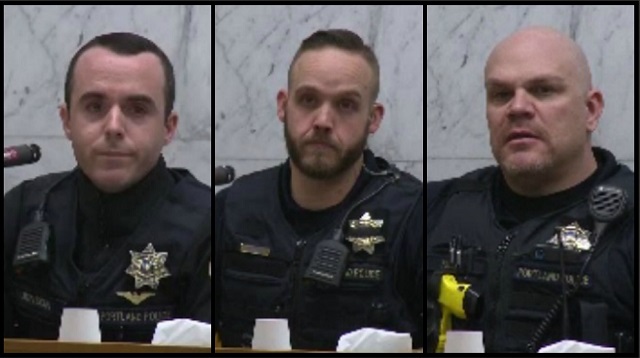
Then Kula yelled the suspect threw the knife and Jenson said he went behind his patrol car and joined other officers. Sometime after that, Jenson testified, Christian yelled something like “Come do it” and put his hands behind his back.
But when officers grabbed Christian’s arms he tried to pull away. Everyone tumbled forward but Christian remained in custody.
What happened next, Jenson testified, was shocking.
Once Christian was placed into a patrol car, “He said, ‘I want to go on the record. I hope those motherf—ers are dead. F— ‘em. I can rest in peace as long as they’re all dead.”
He spat in the patrol car, said there was going to be “piss and s—” n the car and that taxpayers would have to clean it up. Jenson’s testimony noted that later Christian said, “You’re a Jew. You’re the worst piece of humanity. … I stabbed them in the neck. I hope they die. … Self-defense is illegal in Oregon?”
Jenson testified he checked “no” to all the required mental health questions on his police report.
‘My finger was on the trigger’
Kula, a veteran PPB officer, testified citizens were pointing Christian out to him but he needed them to clarify exactly who. He got his rifle out of the car and began to give commands, but said it turned into an argument. He lowered his voice and told Christian he needed to surrender.
Christian still had the knife and was still waving it around. Other officers tried to keep Christian contained once they arrived at the scene.
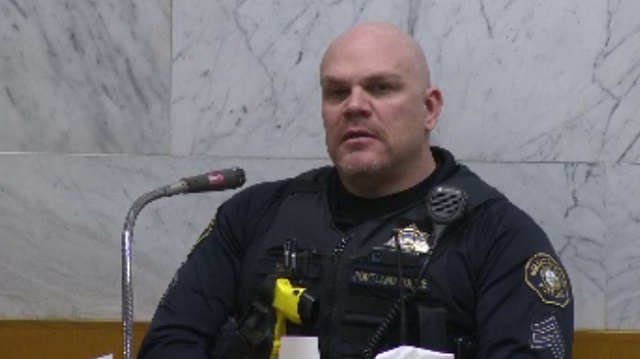
At one point Christian told him he had been “shot in the face by police in the past and that I couldn’t hurt him,” Kula testified. “I’d better shoot him because he was not going to drop the knife or get on the ground.”
Kula also remembered Christian saying, “Those people are gonna be talking out of the side of their neck.”
“I believed he was talking about the people he had stabbed,” Kula said.
During cross examination, defense attorney Greg Scholl asked about some of the de-escalation techniques officer Kula used and if Christian seemed concerned at all about what was happening.
Kula said that was correct and confirmed that, at some point, Christian appeared to be getting on his knees, then stood back up a number of times.
When the prosecution got an opportunity to redirect, they asked what would have happened if Christian had moved any closer to Kula.
“I was prepared to shoot him,” Kula answered. He added later there were a “few times when the safety was off my rifle and my finger was on the trigger.”
‘This is a hate crime. I hope they all die’
The 7th and final witness called on Day 5 of testimony was PPB Detective Rachel Baer. At the time of the attacks, she was a patrol officer at Portland’s Central Precinct where they had what are called MAV vehicles — cars that have cameras and audio recording both inside and out.
In earlier testimony, Officer Jenson mentioned he thought they should get a MAV to the scene because of the things Christian was saying.
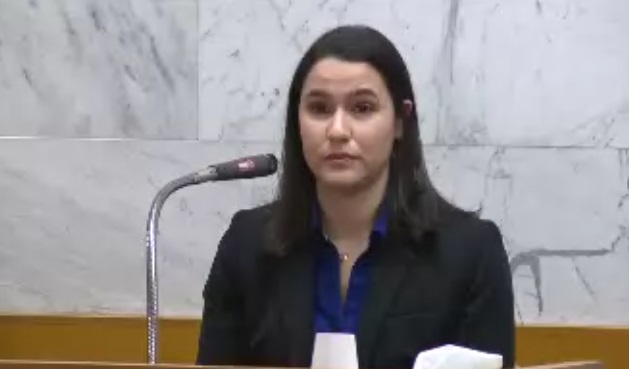
Baer testified she took a MAV to Providence Hospital, where Christian was allegedly being belligerent with hospital staff. Baer said he had tried to spit on one of the employees, so they put a “spit hood” over him.
“You can all die, just like the motherf***ers I stabbed in the neck,” Baer testified he yelled at the medical staff.
For more than 30 minutes, a video from the MAV was played in court. The video was filled with obscenities, racist language and hate speech and a person identified as Christian was heard ranting for more than 10 minutes before he was even put in a patrol car.
His topics ping-ponged rapidly, from the declaration he just stabbed people to ramblings about free speech” “It’s called freedom,” and “You don’t like it, go to Mexico!”
At this point, Christian appeared to start laughing in the courtroom and laughed several times at the video. At other times he appeared to nod.
About 20 minutes into the video, as he is being driven to the police station in handcuffs and a spit hood, Christian said: “This is a hate crime. Hope they all die. Hope they all die.”
Witness saw the attack, followed Jeremy Christian
Garrett Chase Robinson took the stand and said that when he heard the commotion on the Green Line train he removed his headphones. Robinson said he saw the defendant shouting at a “black man who was trying kind of not to provoke him in anyway.”
Then Robinson described someone pushing past him with their phone out. Robinson says he saw Christian “swat” the phone out of his hand.
Asked if he saw the man with the phone — who was Taliesin Namkai-Meche – put his hands on the defendant, Robinson said he didn’t.
After the phone was knocked down, he said both men stood up and it looked like they started to push each other.
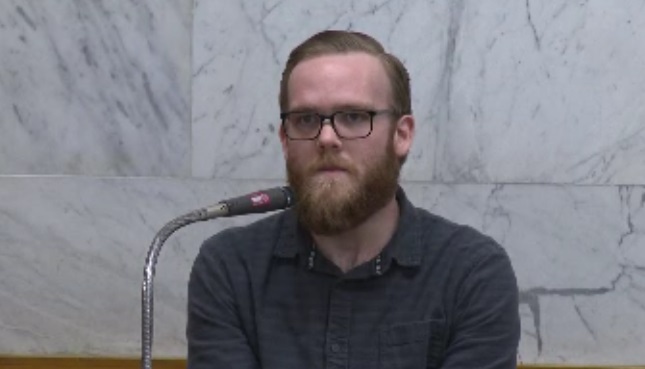
Like many other witnesses, Robinson said he thought he saw Christian throw a punch, not realizing there was a knife involved.
Robinson says he was “terrified” and “anxious.” He remembers stepping back and forth between the platform and the train, trying to figure out what to do.
He doesn’t have any medical training and he saw Christian going up the stairs, so he decided to follow him and make sure he could help police find him. He also tried to call 911, but got flustered by a series of prompts he was supposed to follow to connect with an operator, so he followed Christian instead.
Christian had a head start, Robinson said, so he ran at some point to try to catch up. He also remembers seeing someone on a skateboard.
A group followed Christian until it seemed like he had gotten away. That’s when, Robinson said, he noticed a small trail following I-84. He poked his head that direction and then “kind of stepped back,” surprised to find Christian just a few feet in front of him.
When Christian saw them, Robinson testified, he grabbed his knife and approached them using some “vague threatening language” before taking off back down the path.
The group followed and Robinson called 911 again, connecting with an operator. He said they saw an officer in a patrol car and flagged them down. Some point after that, Robinson started recording video, which prosecutors played in court.
The video shows a police car in the street, sirens wailing and more police cars arriving. A man — Jeremy Christian — walks back and forth on the sidewalk and in the street.
In the background, Robinson can be heard on the video talking to someone else and mentions hearing “him say some racist s—” and that “he f—ing stabbed them.”
Once police asked bystanders to leave, Robinson said he got a ride home with Alvin Hall (who testified last week), whom he had just met.
Christian ‘told us we’re gonna have to shoot’
Portland Police Officer Edward Johnson followed Robinson’s testimony. Johnson is seen in the video Robinson took as he arrived on scene.
Johnson said he saw Christian holding a knife. The only “less lethal” option he had was a Taser, which Christian saw.
“You gonna Tase me, ni—r? I see you holding your Taser?” Johnson testified, referring to a report he wrote that day.
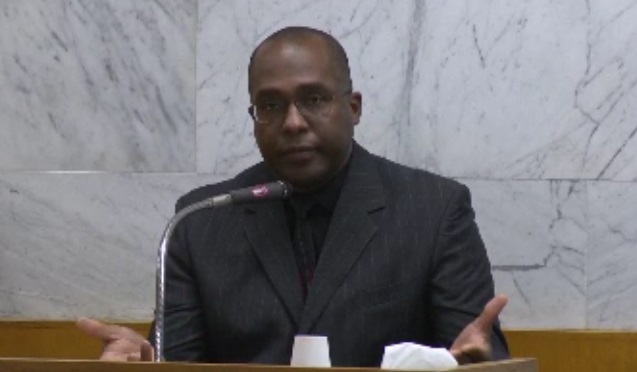
Christian eventually ended up running east, Johnson testified, still in the direction of Providence Hospital. At one point, he said Christian “told us we were gonna have to shoot.”
A patrol car cut Christian off and Johnson said he actually did try to Tase him, but only one probe made contact, rendering the Taser useless.
Christian ended up throwing the knife, Johnson said and, eventually, other officers arrived and arrested him without further incident.
But things got testy during cross-examination with defense attorney Dean Smith asking Johnson to go through numerous de-escalation and force options, from hand-to-hand, takedowns, up to batons.
Johnson sighed heavily and at one point said, “I’m not quite sure where you’re going with it.”
Later, when discussing the Tasers, Smith asked what police protocol says happens next.
“You have the option of actually trying again with the Taser,” Johnson said, adding that generally if that’s not working you would want to use additional force. Smith asked what that would be and Johnson answered, “It all depends on what situation you’re talking about … I need you to explain further what you’re talking about … you’re kind of broad.”
Eventually, Smith moved on to the fact that Christian was taken into custody without lethal force. At that point he had already thrown the knife, so was it determined that he didn’t have a weapon, Smith asked.
“No, that’s perceived on your part,” Johnson answered. Christian could have had additional weapons under his clothing, he said.
When the prosecution got a chance for redirect, they asked about mental health indicators that Johnson was required to check off on his report. Johnson marked “no” for all boxes relating to mental health.
The defense objected to this line of questioning and the judge reminded the jury that Officer Johnson is not a licensed psychiatrist.
Eye doctor takes the stand
The first witness called Monday was ophthalmologist Dr. John Clements. He gave jurors a lengthy explanation of the workings of human eyes and what can happen if the eyes sustain traumatic injuries.
Clements did not examine Demetria Hester, the woman Christian is accused of throwing a Gatorade bottle at the night before the deadly MAX attack, but he has reviewed videos of the alleged attack.
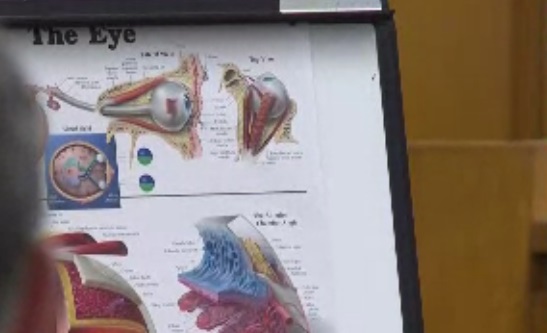
Those videos were played in court and Dr. Clements reviewed photos of Demetria Hester’s eye taken just minutes after the incident.
He pointed out several small abrasions, fresh blood, swelling and bruising. He testified that any type of swelling similar to that seen in Hester is “indicative that a larger blood vessel has been broken.”
Prosecutors asked about Hester’s claims that the pain lasted about 30 days and continued sensitivity to light now almost 3 years later. Clements said that, depending on the nature of the “traumatic injury” there are things that could happen to give someone light sensitivity for years afterward.
In cross-examination, Christian’s defense lawyers asked if he could really know all this without having examined the patient.
For all you know, they said. A full recovery might have occurred.
“That is in the realm of possibility,” Clements answered.
THE CHARGES AND THE TRIAL
The trial, which started January 28 at the Multnomah County Courthouse, has already seen more than a dozen witnesses take the stand. They’ve provided painful first-hand accounts of what happened on the Green Line train at the Hollywood Transit Center on May 26, 2017.
Jeremy Christian is accused of killing Taliesin Namkai-Meche and Ricky Best and nearly killing Micah Fletcher that day on the train. He has pleaded not guilty to 12 charges: two counts of first-degree murder, one count of first-degree attempted murder, one count of first-degree assault, one count of second-degree assault, three counts of second-degree intimidation, two counts of unlawful use of a weapon and two counts of menacing.
Digital reporter Hannah Ray Lambert covers the Jeremy Christian trial for KOIN 6 News and KOIN.com. For her constantly-updated, minute-by-minute breakdown of the testimony, click here.
Complete KOIN Coverage: The MAX Attack Trial
KOIN 6 News will be in the courtroom each day
and provide updates throughout the case
